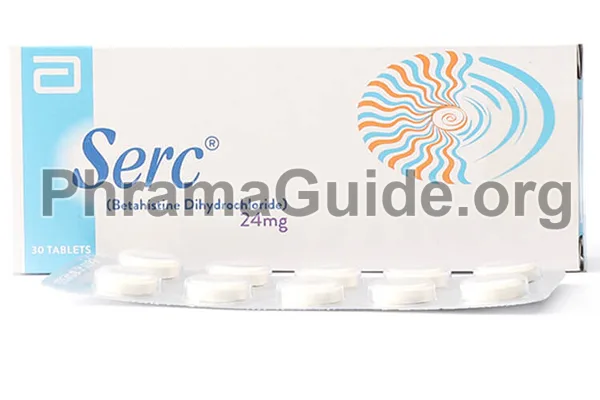Serc tablet is primarily used to manage symptoms of vertigo and Meniere’s disease, which are characterized by dizziness, imbalance, and ringing in the ears. Following are some common uses of Serc Tablet:
- Vertigo: Serc tablet is commonly used to treat vertigo, a sensation of spinning or whirling that can occur due to various conditions, such as inner ear disorders, head injuries, or migraines.
- Meniere’s disease: Serc tablet is commonly used to treat Meniere’s disease, a condition that affects the inner ear and causes symptoms such as vertigo, ringing in the ears (tinnitus), and hearing loss.
- Vestibular Disorders: Serc tablets may also be used to treat other vestibular disorders, such as benign paroxysmal positional vertigo (BPPV) and vestibular neuritis.
- Motion Sickness: Serc tablets may also be used to treat motion sickness, a type of dizziness that can occur during travel or motion.
- Tinnitus: Serc tablets can also be used to treat tinnitus, a ringing or buzzing sound in the ears, which is often associated with inner ear disorders.
Off-label Uses of Serc Tablet
- Migraine Headaches: Serc tablets have many other potential uses including migraine headaches, and certain types of brain tumors as well as reducing tinnitus associated with certain conditions such as presbycusis (age-related hearing loss) and acoustic neuroma (benign growths on nerve endings).
- Dizziness and Balance Disorders: In certain situations, Serc tablets may be considered for individuals with unexplained dizziness or balance problems, especially if related to inner ear dysfunction.

What is Serc?
Serc is one of the leading brands of Betahistine Dihydrochloride, manufactured and marketed by Abbott Laboratories.
Serc Alternatives : Other Similar Brands
The following are some alternative brands of Serc and their manufacturers.
- Enier : Sami Pharmaceuticals (Pvt) Ltd, Pakistan.
- Setspin : Pharmevo Pakistan (Pvt) Ltd.
- Scitin : Scilife Pharmaceuticals (Pvt) Ltd, Pakistan.
- Hiserk : Nimrall Laboratories, Pakistan.
- D-Vert : Remington Pharmaceutical Industries (Pvt) Ltd, Pakistan.
- Zertigo : Akhai Pharmaceuticals (Pvt) Ltd, Pakistan.
- Vergo : Genetic Pharmaceuticals, Pakistan.
- Histogen : Genom Pharmaceuticals (Pvt) Ltd, Pakistan.
- Seso : Getz Pharmaceuticals (Pvt) Ltd, Pakistan.
- Vetinil : Standpharm Pakistan (Pvt) Ltd.
Serc : Available Formulations and Strengths
Presently, Serc is available in Tablets form
Serc Tablets : 8mg and 16mg strengths
Who Should Not Use Serc?
While using the Serc tablet can be beneficial, it does have some contraindications which must be taken into consideration.
Some contraindications include pregnancy/breastfeeding since there isn’t enough research available about its safety during these times;
Patients who are allergic/sensitive to any ingredient found in Serc
Patients taking medications that interact with Serc including anticholinergic drugs like atropine
Those suffering from kidney disease
Those suffering from liver problems
Those with cardiovascular diseases like hypertension etc.
People recovering from surgery etc.
Additionally, precautions should also be taken before using Serc tablets especially if you suffer from asthma or any other respiratory illness including COPD (Chronic Obstructive Pulmonary Disease) since it could possibly cause bronchospasm due to its anti-histamine properties.
What is the Recommended Daily Dosage of Serc?
Serc for Vertigo and Meniere’s Disease: one tablet two times daily (48mg/day) with meals.
The dosage may be increased up to a maximum of two tablets three times daily (144mg/day) as needed.
How Serc Works?
Serc is an anti-histamine that works by increasing blood flow to the inner ear structures. This increased blood flow helps to improve balance and reduce vertigo.
Serc improves the circulation of the inner ear with a partial agonist action on the H₁ receptors at post-synaptic and antagonist acts on H₃ receptors at presynaptic neurons.

Leave A Comment